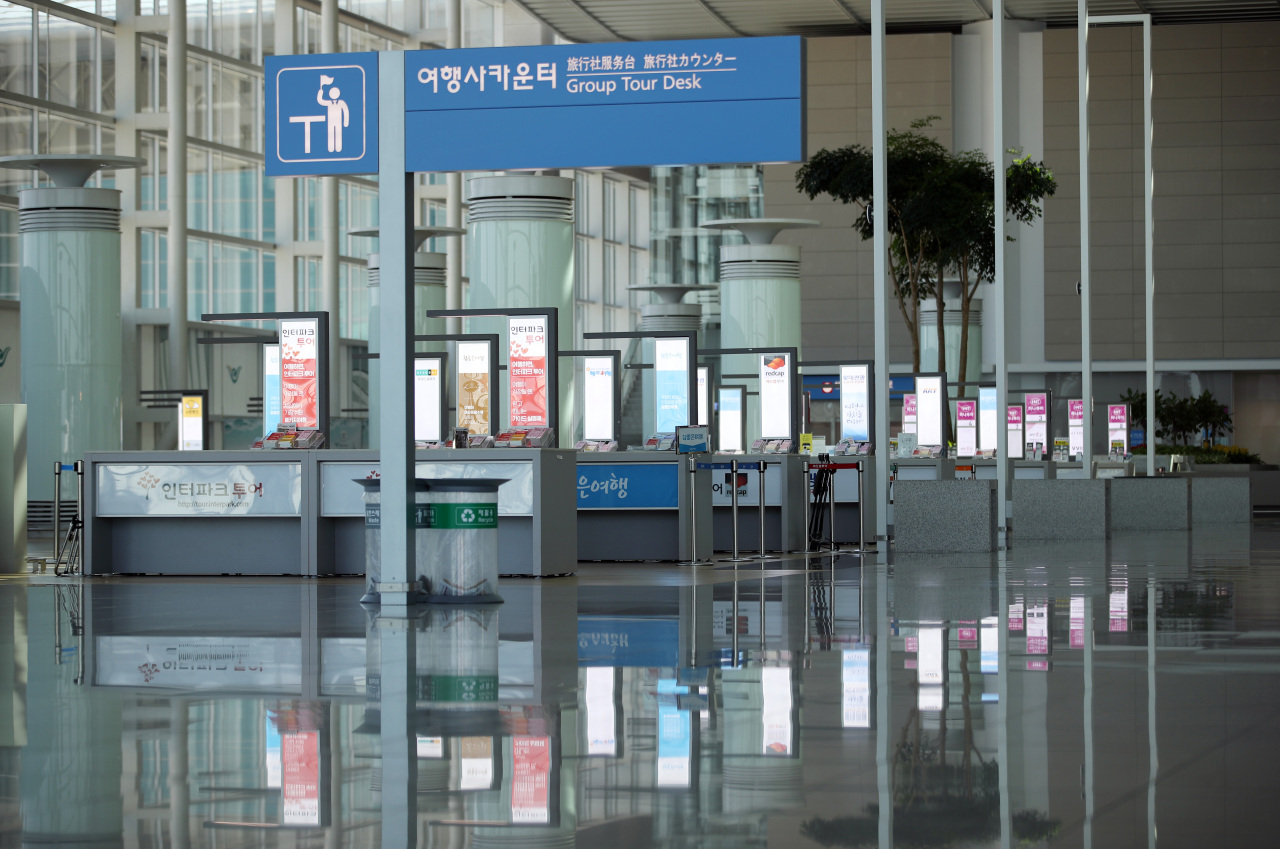
Fifty days after confirmation of the first novel coronavirus case in South Korea, the economy is in a tailspin with major industries facing severe setbacks amid production disruptions, falling consumption and growing uncertainties.
As of Monday morning, the number of confirmed COVID-19 patients stood at 7,382, up 248 from the previous day, while the death toll stood at 51.
As the outbreak continues to escalate, global investment banks and rating firms -- including Morgan Stanley, Nomura, Standard & Poor’s and Moody’s -- have all revised their outlook for the Korean economy down south.
The aviation and travel industries have suffered the most.
Last month, the cumulative number of international passengers -- both departures and arrivals -- for eight domestic airlines was about 2.7 million, down 46.8 percent from February last year, according to government data.
The trend is expected to continue as the number of countries that are restricting or denying entry to travelers from Korea is rising -- from the current 106. Meanwhile, Korea and Japan have mutually tightened entry restrictions for people traveling between the two countries.
According to the Korea Civil Aviation Association, the number of international passengers dropped 65.8 percent on-year to 652,626 in the fourth week of February. The total number of Korean Air passengers on international flights stood at 610,000 in February, down 37.6 percent from a year earlier.
Low-cost carriers have sustained an even more serious blow. Air Seoul has temporarily suspended flights on all 11 of its international routes. Air Busan now operates only four routes out of its usual 32. Eastar Jet continues to operate only six of its 34 international routes. T’way Air, Jeju Air and Jin Air offer fewer than half the usual number of international flights.
Major travel agencies saw their sales plunge more than 80 percent in February. At Hana Tour, the nation’s biggest travel agency, the number of customers traveling overseas dipped to 49,000, down 84.8 percent from the same period last year. Mode Tour, which has the second-largest market share here, saw a 77 percent decline in overseas travel demand during the same period.
The nation’s key tech companies, which operate plants in Gumi, North Gyeongsang Province, have also faced production disruptions. The Gumi industrial complex, home to leading Korean companies, is near Daegu where more than 70 percent of Korea’s confirmed COVID-19 cases have occurred.
On Saturday, Samsung Electronics decided to temporarily shift the production of its premium smartphones, including phones in the Galaxy S20 series, to Vietnam after repeatedly shutting down its Gumi facility because five employees there tested positive for the new coronavirus infection.
Other tech firms, including LG Display and LG Innoteck, also had to shut down their plants for a few days after some of their workers were confirmed positive.
Automakers faced setbacks due to parts supply disruptions from China and some of their employees tested positive.
Hyundai Motor’s Ulsan plant and Hyundai Mobis’ technology lab in Gyeonggi Province had to close for a couple of days over the past month after a few employees tested positive. Earlier, the automaker had to shut down its plants because of parts shortage from China.
Sales at five local automakers -- Hyundai Motor, Kia Motors, SsangYong Motor, Renault Samsung and GM Korea -- stood at 81,722 vehicles in February, down 21.7 percent from the same month last year. Their exports to China, the world’s largest automobile market, declined 36.3 percent during the same period.
Analysts say Korea’s economic outlook has darkened due to the global spread of the coronavirus.
Shaun Roache, Asia-Pacific chief economist at Standard & Poor’s Global Ratings, said, “Local coronavirus transmission in Japan and Korea add a new, highly uncertain dimension to problems in these economies.
“Households are likely to respond to a greater risk of infection by avoiding public spaces, which will depress spending on discretionary goods and services. We estimate Korea’s economic growth to slow to 1.1 percent (this year).”
The United Nations Conference on Trade and Development said COVID-19 damaged Korea’s exports last month. The agency estimated that exports from the European Union in February would have declined the most, to $15.8 billion, followed by the US with $5.8 billion, Japan ($5.2 billion) and Korea ($3.8 billion).
By Shin Ji-hye (shinjh@heraldcorp.com)




![[Herald Interview] 'Amid aging population, Korea to invite more young professionals from overseas'](http://res.heraldm.com/phpwas/restmb_idxmake.php?idx=644&simg=/content/image/2024/04/24/20240424050844_0.jpg&u=20240424200058)












![[KH Explains] Korean shipbuilding stocks rally: Real growth or bubble?](http://res.heraldm.com/phpwas/restmb_idxmake.php?idx=652&simg=/content/image/2024/04/25/20240425050656_0.jpg&u=)

